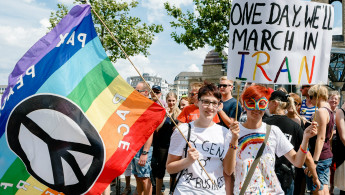Gay Iranian refugee sues over being 'outed' in documentary
An Iranian refugee is suing Canada's public broadcaster and two affiliated journalists after CBC aired a documentary that he says outed him as gay without his consent and which led to abuse and harassment in Iran.
Farzam Dadashzadeh says the CBC documentary, Inside Iran's Secret Gay World, which first aired in 2007, showed footage of him at a weekly gathering for LGBTQ Iranians at a café in Tehran known as the Jam-a-Jam restaurant.
Dadashzadeh "did not know, and could not reasonably know" that he was being recorded because the filmmakers used a hidden camera, the lawsuit states.
Filed in the Supreme Court of British Columbia on 15 August, the lawsuit states that Dadashzadeh suffered from threats of physical harm, sexual assault, arrest, imprisonment, and alienation from friends and family.
Dadashzadeh also says he continues to suffer from depression, insomnia and anxiety as a result.
"The Defendants knew or ought to have known that the Plaintiff was a reasonably foreseeable victim, as a homosexual in Iran," reads the lawsuit, which names CBC and journalists Evan Solomon and Farid Haerinejad as defendants.
"We became aware of the lawsuit last week and are taking some time to consider our options," CBC spokesperson Emma Bedard said in a brief email on Tuesday.
Sodomy is a crime punishable by death in Iran, and other forms of sex between two men or two women are punishable by 100 lashes and death on the fourth conviction, according to Human Rights Watch.
 |
Sodomy is a crime punishable by death in Iran, and other forms of sex between two men or two women are punishable by 100 lashes and death |  |
"Discriminatory laws and policies against homosexuals and other sexual minorities in Iran put them at risk of harassment, violence, and even death," the group found.
At the time the documentary was shot, Dadashzadeh was 19 years old. He was studying English at university and worked as a hair stylist. His homosexuality was unknown to his friends and family, save for an aunt living abroad, the lawsuit states.
In the documentary, which is still available online, Solomon narrates that, "the people you’re looking at in this café are risking their lives", as the camera clearly shows close-ups of patrons' faces.
"They can be arrested, tortured, or killed just for being themselves," he continues.
Later in the film, Solomon says: "We keep our camera hidden, but [Iranian gay rights activist] Mani has told the crowd that we're there to film, and there’s group consent."
But the lawsuit alleges that by using the hidden camera, the journalists "denied [Dadashzadeh] the opportunity… to leave the area, cover his face, take other measures to conceal his identity or otherwise avoid being recorded".
 |
Discriminatory laws and policies against homosexuals and other sexual minorities in Iran put them at risk of harassment, violence, and even death |  |
Dadashzadeh says he became aware of the documentary in March 2007, and his immediate family disowned him after they found out about it shortly thereafter.
That same month, Dadashzadeh says a person he did not know physically assaulted him and called him a "faggot". He was arrested after the attack and held in prison for approximately two weeks, during which time he was interrogated and asked about the documentary, the lawsuit states.
He also alleges that while he was detained, other prisoners sexually assaulted, beat and kicked him. The violence was carried out with the assistance of Iranian security forces, the lawsuit alleges.
Upon his release from prison, Dadashzadeh was exempted from mandatory military service in Iran on the basis of having a "sexual disorder", the lawsuit states. Not completing his military service meant that Dadashzadeh was unable to get a stable job, he says.
In 2011, Dadashzadeh fled Iran for Turkey. He was recognised by the United Nations as a refugee on the basis of his sexual orientation that same year. He was granted asylum in Canada in 2014.
Jillian Kestler D'Amours is a journalist based in Canada. Follow her on Twitter: @jkdamours



